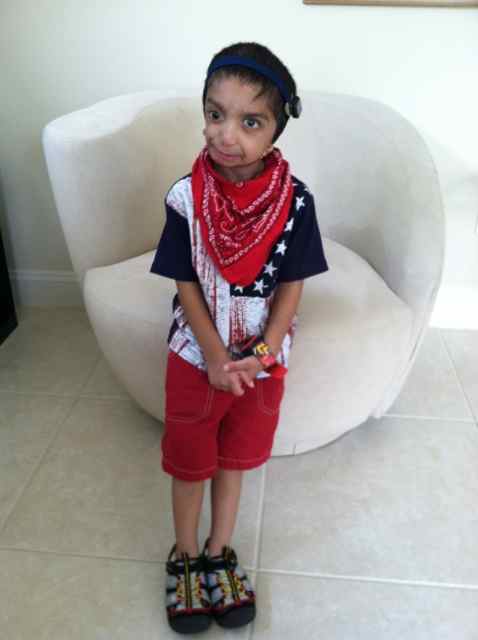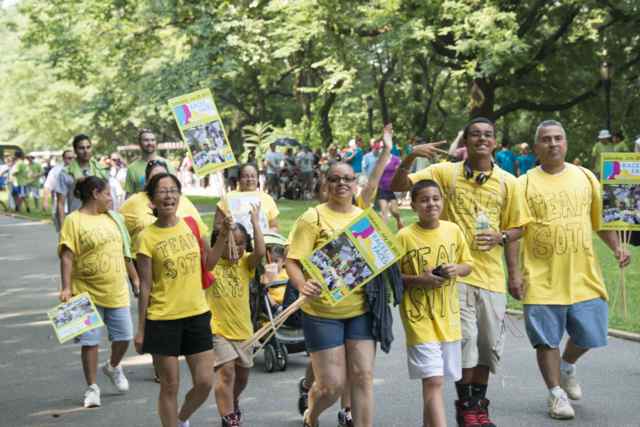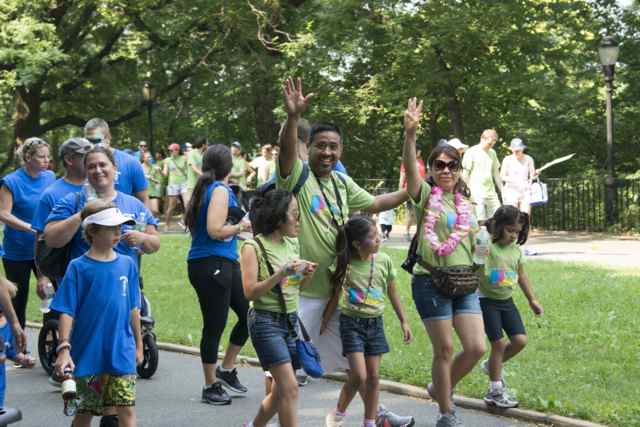When Kiran Fernando was born on Dec. 29, 2008 his mother Dana Fernando remembers waiting to hear her baby cry for the first time. It seemed to take forever. And when he finally did make a sound, Kiran's cry seemed very weak and muted. "But I was ecstatic he was here and I just cried normal tears of joy," recalls Fernando.
The combination of Fernando's unplanned C-section and Kiran's fetal distress, which included his umbilical cord wrapped around his neck, kept Fernando from seeing her son before she was whisked away to the OR. But while in the recovery room, she learned the overwhelming news of her son's condition. His right eye was abnormally small, his vision was unclear, his ears were malformed, his right jawline was under developed, his chin was small. Says Fernando, "the list of problems seemed to go on and on."
Kiran had Goldenhar Syndrome, a rare congenital birth defect involving the abnormal development of the bone and soft tissue of the head and face.
The first 48 hours after Kiran's birth was a complete blur. The family saw an endless cadre of specialists. "You don't realize the strength you have until you're forced into a situation that is truly unimaginable," remembers Fernando. "Never in our wildest dreams did we anticipate this."
Kiran spent a very difficult six months in the the hospital's NICU on oxygen and hooked up to tubes and machines. The family was completely lost. The hospital did their best to treat the issues at hand -- eating and breathing. And Kiran had two surgeries. But the hospital's lack of medical expertise with Kiran's condition proved challenging.
But once Kiran was discharged from the hospital, they finally found hope. The family turned to the Institute of Reconstructive Plastic Surgery (IRPS) at NYU Langone Medical Center and never looked back. At the IRPS they connected with pediatric nurse practitioner, Patricia Chibbaro, who for 27 years has devotedly cared for countless children like Kiran. "She was the first angel to come into our lives," says Fernando who soon learned that Kiran was on the severe side of the Goldenhar spectrum and needed very complex care. "It was a huge sigh of relief that we finally were dealing with people who understood Kiran's challenges," recalls Fernando. "A few days later, Kiran was transferred to the NYU NICU and that's where miracles started to happen."
Kiran has had 11 surgeries, including jaw surgeries, soft cleft palate repair, tongue suspension, diaphragm correction. And it is estimated that he will require at least 10 more procedures including heart surgery, ear reconstruction and several more jaw surgeries.
"Dealing with a child with such complex medical needs, and a rare condition to boot, leaves you feeling scared, lost, sad, frustrated, overwhelmed and alone," says Fernando who adds that many times critical intervention was needed after surgeries to ensure Kiran lived. And she credits this to his team of doctors at the IRPS, including Dr. Stephen Warren, ("our second angel," adds Fernando), who expertly knows how to deal with all phases of Kiran's care.
The IRPS is funded by an organization called National Foundation for Facial Reconstruction (NFFR). And for more than six decades the NFFR has helped over 60,000 children at the IRPS get the treatment they need for a variety of facial birth defects. In fact, 70 percent of the families whose children receive treatment live at or below poverty level and do not have insurance. But no family is ever turned away.
"Rarely do you come across a team of doctors, nurses, and therapists who are so exceptional at what they do professionally, but also have a bedside manner that's on par to none," says Fernando. "And the team has handled insurance authorizations, pre-surgery appointments, nursing care coverage requests and the seemingly endless authorization letters needed. When you're overwhelmed with the day-to-day care of your child, this type of support is essential."
Also, Fernando found the IRPS and NFFR's work extended far beyond medical care. Initially, everything revolved around Kiran's medical intervention and surgical path. "Knowing your options and having a medical plan in place helps immensely," says Fernando. "But having a six-member psychosocial team holding your hand through the journey is a whole other thing. From day one, the nurse practitioner and social worker were instrumental in providing care to our family. They sat with us at Kiran's crib, kept us informed of Kiran's progress as we waited through long surgeries which have lasted 10 hours, and just made our long stays at the hospital more comfortable and less lonely." And now that Kiran is getting older, the NFFR is working with the family on how to prepare him for how others may treat him.
For the past two years, the NFFR has hosted a walk called Races For Faces to help raise money so children like four-year-old Kiran Fernando can get treatment and other key services. Not only is the walk an important fundraiser, it's an opportunity for families to support each other. "The NFFR provides us strength, unity, and camaraderie through social networking with other families, "says Fernando. "I was lucky enough to have 17 family and friends walk with us at last year's walk. We enjoyed watching the kids have fun getting their faces painted and watching other families bond with their team t-shirts."
This past July, the walk raised over $120,000 and included 500 walkers and volunteers. "You surely don't feel alone in your journey when you see hundreds of other people walking in the same shoes as you," says Fernando. (In fact, Kiran was appointed the walk's grand marshal this year.) "It also reminds you that there are so many wonderful people in this world who have been impacted by our families and want to share in creating positive experiences for our children. And these positive experiences are all supported through all the services provided by the NFFR."
These days, Kiran is known as "the mayor" in his school because he greets everyone he sees. He reads books and loves to play with his friends and little brother. "Kiran has taught us all how to appreciate the little things in life," says Fernando. "Each milestone, no matter how small, is something to be proud of."
To learn more about the NFFR and its many programs visit, www.nffr.org

Kiran Fernando (Photo credit: Dana Fernando)

Fun at the NFFR's Walk, Races for Faces (Photo credit: Mary Spano)

(Photo credit: Mary Spano)
All photos used with permission.
